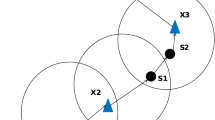Abstract
Despite the numerous research advances in multichannel event reporting (ER) protocols in Wireless Sensor Networks (WSNs), the core issues such as effective energy consumption management, balanced network-wide energy depletion rates, fault-avoidance-based fault tolerance (FT) for network reliability and elimination of needless data redundancies in ER remain challenges that have not received adequate and holistic research considerations commensurable with the recent technological advancements and the skyrocketing demands and permeance of WSN’s applications in all fields of life. RCEEFT is an adaptive cluster-based data acquisition and multichannel routing protocol for WSNs which integrates unique measures to ensure peerless improvement in WSNs’ energy consumption, balanced network-wide energy depletion rates (improved sensor field coverage), fault-avoidance-motivated FT and elimination of needless data redundancies in ER (enhanced accuracy and precision in ER) to extend the WSNs’ lifespan. The experimental results obtained through simulations established RCEEFT as a more realistic protocol and also performs better than EESAA, DEEC, E-DECC, SEP, M-GEAR, D-DEEC, T-DEEC and LEACH in terms of energy efficiency and WSN lifetime, wider coverage sensitivity, balanced network-wide energy depletion rates, FT and elimination of needless data redundancies in ER.
Access this chapter
Tax calculation will be finalised at checkout
Purchases are for personal use only
Similar content being viewed by others
References
Yu, Q., Li, G., Hang, X., Fu, K.: An energy efficient mac protocol for wireless passive sensor networks. Future Internet 9(2), 1–12 (2017)
Effah, E., Thiare, O.: Survey: faults, fault detection and fault tolerance techniques in wireless sensor networks. Int. J. Comput. Sci. Inf. Secur. (IJCSIS) 16(10), 1–14 (2018). ISSN 1947-5500
Darwish, I.M., Elqafas, S.M.: Enhanced algorithms for fault nodes recovery in wireless sensors network. Int. J. Sens. Networks Data Commun. 6(1), 1–9 (2016). https://doi.org/10.4172/2090-4886.1000150
Titouna, C., Ari, A.A.A., Moumen, H.: FDRA: fault detection and recovery algorithm for wireless sensor networks. In: International Conference on Mobile Web and Intelligent Information Systems, pp. 72–85. Springer, Cham (2018)
Souissi, I., Ben Azzouna, N., Ben Said, L.: A multi-level study of information trust models in WSN-assisted IoT. Comput. Netw. 151, 1–12 (2019)
Xu, G.C.R., O’Hare, L.: A smart and balanced energy-efficient multihop clustering algorithm (smart-BEEM) for MIMO IoT systems in future networks. Sensors 17, 1574 (2017)
Shah, T., Javaid, N., Qureshi, T.: Energy efficient sleep awake aware (EESAA) intelligent sensor network routing protocol. In: International Multitopic Conference (INMIC), pp. 317–322 (2012). https://doi.org/10.1109/INMIC.2012.6511504
Mehmood, A., Mauri, J.L., Noman, M., Song, H.: Improvement of the wireless sensor network lifetime using leach with vice-cluster head. Ad Hoc Sens. Wirel. Netw. 28, 1–17 (2015)
Younis, O., Fahmy, S.: HEED: a hybrid, energy-efficient, distributed clustering approach for ad hoc sensor networks. IEEE Trans. Mob. Comput. 3(4), 660–669 (2004)
Lindsey, S., Raghavendra, C.S.: PEGASIS: power-efficient gathering in sensor information systems, vol. 3, p. 3 (2002). https://doi.org/10.1109/AERO.2002.1035242
Smaragdakis, G., Matta, I., Bestavros, A.: SEP: a stable election protocol for clustered heterogeneous wireless sensor networks, pp. 1–11 (2004)
Qing, L., Zhu, Q., Wang, M.: Design of a distributed energy-efficient clustering (DEEC) algorithm for heterogeneous wireless sensor network. Comput. Commun. 29, 2230–2237 (2006)
Elbhiri, B., Saadane, R., El Fkihi, S., Aboutajdine, D.: Developed distributed energy-efficient clustering (DDEEC) for heterogeneous wireless sensor networks. In: 5th International Symposium on I/V Communications and Mobile Network (ISVC), pp. 1–4. IEEE (2010)
Saini, P., Sharma, A.K.: E-DEEC- enhanced distributed energy efficient clustering scheme for heterogeneous WSN. In: 2010 1st International Conference on Parallel, Distributed and Grid Computing (PDGC - 2010), pp. 205–210 (2010). https://doi.org/10.1109/PDGC.2010.5679898
Pankaj, K., Barwar, C.: Performance and comparative analysis of distributed energy efficient clustering protocols in wireless sensor networks. Int. J. Adv. Electron. Comput. Sci. 3(7), 17–22 (2016). ISSN: 2393-2835
Nadeem, Q., Rasheed, M., Javaid, N., Khan, Z., Maqsood, Y., Din, A.: M-GEAR: gateway-based energy-aware multi-hop routing protocol for WSNs. In: Eighth International Conference on Broadband and Wireless Communication and Application, pp. 164–169, July 2013. https://doi.org/10.1109/BWCCA.2013.35
Gurpreet, K., Sukhpreet, K.: Enhanced M-GEAR protocol for lifetime enhancement in wireless clustering system. Int. J. Comput. Appl. 147(14), 30–34 (2016)
Rajeev, K., Rajdeep, K.: Evaluating the performance of DEEC variants. Int. J. Comput. Appl. 97(7), 9–16 (2014)
Chouikhi, S., Elkorbi, I., Ghamri-Doudane, Y., Saidane, L.A.: A survey on fault tolerance in small- and large-scale wireless sensor networks. Comput. Commun. 69, 22–37 (2015)
Titouna, C., Aliouat, M., Gueroui, M.: FDS: fault detection scheme for wireless sensor networks. Wirel. Pers. Commun. 86(2), 549–562 (2016)
Kakamanshadi, G., Gupta, S., Singh, S.: A survey on fault tolerance techniques in wireless sensor networks. In: 2015 International Conference on Green Computing and Internet of Things (ICGCIoT), Noida, pp. 168–173 (2015). https://doi.org/10.1109/ICGCIoT.2015.7380451
Effah, E., Thiare, O.: Estimation of optimal number of clusters: a new approach to minimizing intra-cluster communication cost in WSNs. Int. J. Innovative Technol. Exploring Eng. 8(7S2), 521–524 (2019)
Shakya, R.K.: Spatial correlation-based efficient communication protocols for wireless sensor networks. Ph.D. thesis, Department of Electrical Engineering, Indian Institute of Technology, Kanpur, India, pp. 1–137 (2014)
Pak, W.: Ultra-low-power media access control protocol based on clock drift characteristics in wireless sensor networks. Int. J. Distrib. Sens. Netw. 13(7), 1–5 (2017)
Kumar, A.: WiseMAC protocol for wireless sensor network-an energy-efficient protocol (2014)
Author information
Authors and Affiliations
Corresponding author
Editor information
Editors and Affiliations
Rights and permissions
Copyright information
© 2020 Springer Nature Switzerland AG
About this paper
Cite this paper
Effah, E., Thiare, O. (2020). Realistic Cluster-Based Energy-Efficient and Fault-Tolerant (RCEEFT) Routing Protocol for Wireless Sensor Networks (WSNs). In: Arai, K., Kapoor, S., Bhatia, R. (eds) Advances in Information and Communication. FICC 2020. Advances in Intelligent Systems and Computing, vol 1129. Springer, Cham. https://doi.org/10.1007/978-3-030-39445-5_25
Download citation
DOI: https://doi.org/10.1007/978-3-030-39445-5_25
Published:
Publisher Name: Springer, Cham
Print ISBN: 978-3-030-39444-8
Online ISBN: 978-3-030-39445-5
eBook Packages: Intelligent Technologies and RoboticsIntelligent Technologies and Robotics (R0)




